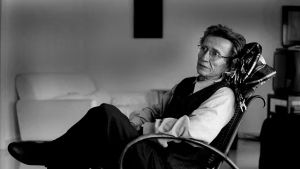Xavier Rubert De Ventós was a philosopher and professor, as well as a Catalan writer and politician. He took part in the anti-Franco resistance as a member of the Front Obrer Català (FOC) and was expelled from his professorship at the University of Barcelona through administrative proceedings. In 1975 he had to go into exile in Paris because of threats from the Falangists. Very active in Catalan public life, he was a regular contributor to various television, radio and print media.
In 1976, together with Eugeni Trías, he founded the College of Philosophy. He was a childhood friend of Pasqual Maragall, with whom he was an underground member of the FOC. He was a member of the Socialist Party of Catalonia and a member of Congress (1982-1986) and the European Parliament (1987-1994).
As a result of this singular trajectory – beginning as a philosophy professor and ending with a seat in Europe – one of his most notable works emerged, El cortesano y su fantasma , of a markedly autobiographical nature, where he reflects on what he observes in the political world of the time – very similar, we could say, to that of today – and from which you can read some excerpts below:
“In politics, you would rather not be literal, but you would rather not be literary either. And be creative enough to become just objective. Speak its language, full of conventions, without believing, but also without rebelling, above all without wanting to give it away”.
“To make oneself in the middle of politics, it is therefore necessary to learn to paralyse, or at least to anaesthetise, whole regions of the soul.”
“I am disturbed by these politicians who feel they must do, do, do…. Things that don’t need to be done at all, as men of letters say, say, say… Sentences that it is not essential to pronounce”.
“Thus I went from being a servant of ideas to becoming a messenger of interests and a trafficker of opinions.”
“Parliament seemed to me more like the Callament: I had to lose the shame of speaking for the sake of not saying anything, of splicing one “obviously” after another…”
“It’s not that the mirror is dirty: it’s that it reflects what’s in front of it.”
“Whoever wants to discredit politicians has it easy: he only needs to apply, to all of them, the adjectives and adverbs with which they tear each other apart.”
“Some things you say so that you don’t have to believe too much; to pass them on to someone else so that you don’t have to believe them…”
“Politicians, champions of the system that evenly kills there of hunger and here of cholesterol, that produces with equality unscrupulous yuppies and homeless old men…”.
“Here, the reiteration of the same adjectives is not done in the service of things, but at the expense of them”.
“And there, in politics, I saw people with an enormous ambition for small things, mediocre even in their selfishness, always tempered by calculation.”
“Since the 1960s, he has seen many alternative movements become corporate in a short time.”
“Realise that individual interests and passions are not the obstacle, but the substance, of politics.”
“I respect you, O politicians! At least because you yourselves help us to despise yourselves!”
“Democracy: A church where everyone is a heretic.”
“Politicians create disorder to base on our needs the tribute we must pay them.”
“Wasn’t it Plato who ironically said that, if we are going to vote, why not also elect plumbers, artists, or veterinarians?”
“With terms like raison d’état, they seek the shelter of a line that, by drawing it, they want to give themselves the illusion of following.”
“In politics, one should not seek knowledge, but the search for, capture and manufacture of opinion.”
“Do you not realise that intelligence thrives not on the increase but on the decrease in ideas?”
“Ideas cannot be lavished without ending by unbuttoning; how do you expect me to give what it is not lawful to have, nor almost to seek?”
“By forcing them to rebel, you force this to oppress them.”
“In philosophy, one tries to explain. In politics, you end up simply replying.”
“Garland and garland in Parliament, to end with a resounding platitude embellished with a boiled metaphor.”
“Entering that world, rather than changing things, it was he who changed and crusted over.”
“Politicians follow the news at all times, immersing themselves in a daze by event.”
“This is how every exotic experience almost always ends up becoming rhetoric.”
“Many things, like Circe, are only given to those who can no longer desire them.”
“Joan Fuster used to say that society is the struggle of man against man by an interposed notary.”
“I never stop thinking that in all these political pacts and negotiations, someone who is not there always pays: a young person, a Saharan, a South American unemployed person, a Palestinian…”.

